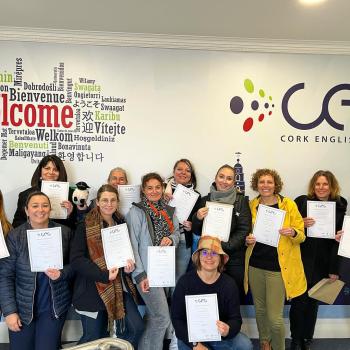
English as a Medium of Instruction
This freshly developed course is based around how to use English as a Medium of Instruction, EMI, in third level institutions.
Description
Objectives of this course include learning about teaching
English to an international student body, discussing and
experimenting with different teaching and learning
methodologies, revising correction, feedback, and assessment
& applying learning to own educational context.
On completion of this course, participants will have learned
about and experimented with different methodologies. The goal
being to find an approach that works in practice.
Learning objectives
Listening Skills:
- Develop the ability to comprehend spoken English at an advanced level, including lectures, discussions, and presentations in an academic context.
Speaking Proficiency:
- Enhance oral communication skills in English, enabling effective and articulate expression of ideas and concepts in both formal and informal settings.
Reading Comprehension:
- Improve reading skills to understand and analyse academic texts, articles, and other materials in English, with a focus on extracting key information.
Writing Proficiency:
- Attain advanced writing skills in English, including the ability to compose clear, coherent, and well-organised academic texts such as essays, reports, and research papers.
Pedagogical Techniques:
- Acquire a repertoire of pedagogical techniques tailored for English as a medium for instruction, encompassing strategies for engaging students and facilitating effective learning.
Cultural Competence:
- Develop cultural competence to navigate and appreciate the diverse cultural backgrounds of students and colleagues in an international educational environment.
Content Integration:
- Learn to seamlessly integrate subject-specific content with English language instruction, ensuring clarity and comprehension for students with varied language proficiency levels.
Assessment Strategies:
- Understand and implement diverse assessment strategies suitable for English-medium instruction, including formative and summative assessments that provide meaningful feedback.
Technology Integration Skills:
- Familiarise oneself with relevant technology tools and platforms to enhance English language instruction, promoting interactive and technology-enhanced learning experiences.
Collaborative Teaching:
- Develop skills in collaborative teaching, fostering partnerships with colleagues to create interdisciplinary approaches that enrich the English-medium learning environment.
Methodology & assessment
Description: Integrate language instruction with academic content, using subject-specific materials to enhance language learning.
Application: Design lessons where students learn English while engaging with course-related content, fostering language skills in context.
Task-Based Language Teaching (TBLT):
Description: Emphasize learning through tasks, where students use English to complete real-world assignments.
Application: Create activities and projects that require communication in English, promoting practical language use.
Language Across the Curriculum (LAC):
Description: Infuse language learning throughout various subjects to promote interdisciplinary language acquisition.
Application: Collaborate with colleagues to integrate language instruction seamlessly into diverse academic disciplines.
Collaborative Learning:
Description: Encourage students to work together in pairs or groups, fostering language development through peer interaction.
Application: Assign collaborative projects that require students to communicate and solve problems in English.
Technology-Enhanced Learning:
Description: Utilize digital tools and platforms to enhance language instruction and provide interactive learning experiences.
Application: Incorporate multimedia, online discussions, and virtual collaborations to supplement traditional instruction.
Assessments:
Formative Assessments:
Purpose: Provide ongoing feedback on student progress.
Examples: In-class discussions, quizzes, short writing assignments.
Summative Assessments:
Purpose: Evaluate overall learning outcomes at the end of a unit or course.
Examples: Final exams, research papers, presentations.
Portfolio Assessment:
Purpose: Showcase a collection of students' work over time, demonstrating language proficiency and development.
Certification details
All partners will recieve a physical and digital certificate containing their course title, learning outcomes, dates, venue and hours achieved. European Mobility Agreement Signed.
Pricing, packages and other information
Additional information
-
Language:English
-
Target audience ISCED:Upper secondary education (ISCED 3)Post-secondary non-tertiary education (ISCED 4)Other
-
Target audience type:Head Teacher / PrincipalICT CoordinatorGovernment / policy maker
-
Learning time:15-20 hours
Past sessions
More courses by this organiser




